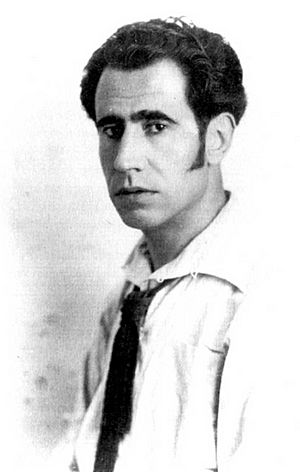Ramón Acín facts for kids
Quick facts for kids
Ramón Acín
|
|
|---|---|

Ramón Acín
|
|
| Born |
Ramón Acín Aquilué
30 August 1888 |
| Died | 6 August 1936 (aged 47) |
| Alma mater | University of Zaragoza |
| Occupation | Painter, writer, teacher, film producer |
| Years active | 1910–1936 |
| Political party | Popular Front |
| Spouse(s) |
Conchita Monrás
(m. 1923–1936) |
| Children | Katia Acín Monrás (1923–2004) |
Ramón Acín Aquilué (born August 30, 1888, in Huesca, Spain – died August 6, 1936) was a talented Spanish artist. He was a painter, sculptor, writer, and teacher. He also believed strongly in fairness and freedom for all people. Ramón Acín was a very creative artist who liked to try new things.
Acín was a good friend of the famous film director Luis Buñuel. He even helped fund Buñuel's film Las Hurdes: Tierra Sin Pan (1932). Because of his help, Ramón Acín is also known as a co-producer of that movie.
Contents
Ramón Acín's Life
Ramón Acín Aquilué was the youngest of three children. His parents were Santos Acín Muliera, who was an engineer, and María Aquilué Royán. Ramón had two older siblings named Santos and Enriqueta.
Early Interest in Art
Ramón loved painting from a young age. When he was just 10 years old, he started taking drawing classes. His first art teacher was a painter named Felix Lafuente. At 12, he went to the Second Teaching Institute in Huesca.
In 1907, Ramón began studying chemical sciences at the University of Zaragoza. However, he soon realized his true passion was art.
Becoming an Artist
By the end of 1908, Acín left his chemistry studies. He returned to Huesca. In 1909, he took more drawing classes. This time, he studied at the private academy of the painter Anselmo Gascón de Gotor.
After this, Ramón Acín decided to focus only on art. In August 1910, a newspaper called El Diario de Avisios de Zaragoza published his first drawings. Later that year, one of his illustrations was featured on the cover of a magazine.
Working with Newspapers
In January 1912, Ramón Acín started working for El Diario de Huesca. He was in charge of the humor section. He used the pen name "Fray Acin" for his work there.
At the same time, Acín also began drawing political cartoons. These cartoons appeared in other newspapers that supported progressive ideas. Some of these papers included El Pueblo and Vida Socialista.
In July 1913, Acín moved to Barcelona. His friend Ángel Samblancat asked him to come. Together, they started a weekly newspaper called La Ira.
In the first issue of La Ira, Acín published a drawing called Id Vosotros. This drawing strongly criticized the war with Morocco. In the second issue, he wrote No Riais, which was a strong criticism of the church. After only two issues, the newspaper was closed, and its editors were put in prison.
His Final Days
In July 1936, a conflict began in Spain. Ramón Acín bravely fought against the military forces. He had to go into hiding when his hometown of Huesca was surrounded.
On August 6, 1936, Acín came out of hiding to protect his wife. Sadly, he lost his life that day. His wife, Conchita, also died seventeen days later during the conflict, along with many other people.
See also
 In Spanish: Ramón Acín Aquilué para niños
In Spanish: Ramón Acín Aquilué para niños
 | John T. Biggers |
 | Thomas Blackshear |
 | Mark Bradford |
 | Beverly Buchanan |

